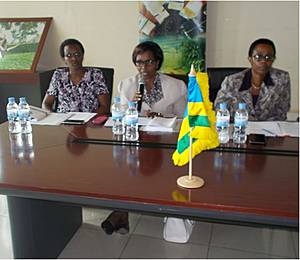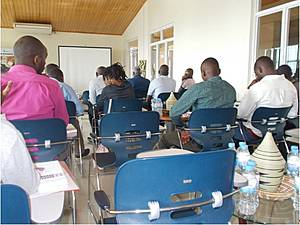MINEACOM, RSB and RDB Conduct Training on HACCP and Relevant Standards on Meat Processing and Handling

RSB and RDB official at the opening of the training
Today, January 23rd, 2017 within the Framework of ensuring safe food along the meat supply and value chain, the Ministry of Trade, Industry and East African Community Affairs (MINEACOM) in Collaboration with Rwanda Standards Board (RSB) and with the support of Rwanda Development Board (RDB) conducts training on Hazard Analysis and Critical Control Point (HACCP) and other relevant standards on meat processing and handling.
The training sees participation of companies and people active in the meat value chain around the country from farm to folk that is farmers, processing and handling businesses including abbatoirs and meat processing and trading units. It designed to be undertaken in three consecutive phases and, the first phase starting on Monday 23rd January 2017.
In order to ensure food safety across the food value chain, standards have been developed and participants will be trained on the following standards: RS 185: 2013; Code of Hygienic Practice for Meat, RS 184: 2013; Hazard Analysis and Critical Control Points, RS 201: 2013; Abattoir — Basic requirements, RS ISO 19011: 2011; Guidelines for auditing management systems, and RS ISO/TS 22002-1: 2009; Prerequisite programmes on food safety — Part 1: Food manufacturing.
Speaking at the opening of the training, Ms Joy S Rwamwenge, SMEs and Business Development Division Manager emphasized Rwanda Development Board’s support to HACCP certification especially, and implementation of food safety standards in general as key aspect in ensuring professionalism and building customer trust in the fast-growing hospitality sector in Rwanda.
She added that Food safety is one of the key challenges to public health, exports and MICE agenda (Meetings, Incentives, Conferencing, Exhibitions), Rwanda has embraced.
Ms Athanasie Mukeshiyaremye, Ag. Division Manager of National Standards Division commended the partnership in government institutions towards attainment of food safety goals set by the country. She reiterated that no food processor can claim compliance with food safety requirements without taking into consideration of the HACCP standard as well as other quality standards. She reminded that “RSB understands that Quality is not an act, but a habit” as Aristotle echoed.

Some of the participants to the training
RDB, MINEACOM and RSB have started combined efforts to increase opportunity for local SMEs to comply with quality standards and unlocking export opportunities. The meat value chain was identified as one that needs special attention given the nature of its products vi-a-vis consumers safety and export opportunities available.
Food safety has been a growing concern worldwide in the recent years due to increased movement of people and food products across borders, changes in food production methods, processing and handling practices, transportation, preservation for longer periods in cold storage, and handling during preparation in case of fresh foods, rapid urbanization, sewage contamination, and most critically, emergence/re-emergence of critical food-borne diseases, microbial food toxins, and heavy metal contaminants from mining waste sites, among others.
The emergence of these illnesses is attributed to the survival and growth of these pathogenic micro-organisms once introduced in any stage of food supply chain, the major being Salmonella spp, Enterobacteriaceae, E.coli, and Listeria spp.
The main food safety challenges that Rwanda is facing today are related to lack of food production-consumption continuum policies and regulations to support Hazard Analysis and Critical Control Point (HACCP) principles embedded in Rwanda Standards. Studies, on fruits and vegetables consumed raw as salads, show that microbial contamination occurs mainly at four stages of production-consumption supply chain, namely: farm (irrigation water, domestic manure and wild animals), transportation (poor handling) and market (water, handling), as well as food vending establishment (water, preparation, cross-contamination, poor storage conditions). The Standards of living of Rwandans will be measured, among other parameters, by basing on the quality and safety of the food they produce, sell locally, regionally and internationally.
There are several institutions in food supply chain which put together efforts for better coordination with respect to the development, and implementation of food safety policies, food control laws and regulations within the HACCP framework. These include the Ministry of Agriculture and Animal Resources (MINAGRI), Ministry of Trade, Industry and East African Community Affairs (MINEACOM), the Ministry of Health (MoH), Rwanda Development Board (RDB), Rwanda Agricultural Development and Export Board (NAEB), Rwanda Agriculture Board (RAB), Rwanda Agriculture and Livestock Inspection and Certification Services (RALIS), Rwanda Standards Board (RSB), National Industrial Research Development Authority (NIRDA), Workforce Development Agency (WDA), and Private Sector Federation.
Food security policies and efforts on increased productivity, value addition and marketing have
been very successful. However, there are still a lot of gaps on the implementation of food safety
principles along the food to fork continuum.
Requirements described in the code of hygiene practices are referred to pre-requisite programs
for implementation of Hazard Analysis and Critical Control Points (HACCP) principles.
HACCP is a robust food safety management system internationally recognized as the basic and
most effective way of assuring food safety. It is applicable along the entire food value chain and
the principles are also applied in pharmaceutical establishments.
Through harmonization of practices and establishment of food safety system Rwanda will, therefore, be more competitive in the agro-processing sector by striving to be the Center of Excellence in as many sectors as possible by observing HACCP principles at farming, food processing and catering levels.